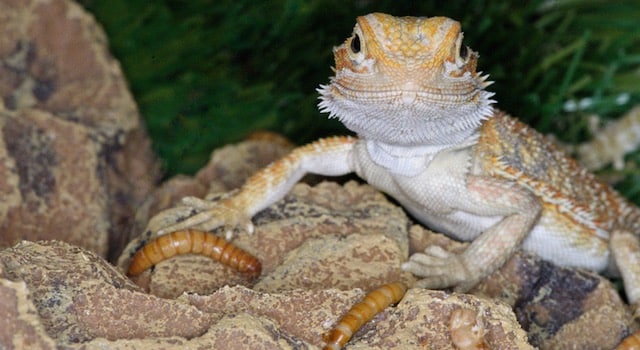
Introduction to Bearded Dragons Not Eating
Bearded dragons are popular pet reptiles from the arid regions of Australia, known for their fascinating behaviors and docile temperaments. They make great pets when cared for properly and can live for up to 15 years.
As a responsible keeper, you should ensure that your bearded dragon eats a balanced diet appropriate for their life stage and maintains a healthy appetite. But what should you do if your bearded dragon refuses to eat? Any sudden changes in appetite can be a cause for concern and shouldn’t be ignored. However, some reasons could be expected, such as during shedding or brumation, concerning reasons could be health problems and diet issues.
This article will discuss common reasons why bearded dragons stop eating and how you can help them regain their appetite.
Common Reasons Why Bearded Dragons Stop Eating
Environmental Issues
One of the main reasons bearded dragons may suddenly stop eating is due to environmental issues, which include temperature, lighting, and stressors. Bearded dragons are cold-blooded, relying on external temperatures to maintain critical bodily functions like digestion and movement. They also need external warmth from their environment to stimulate a healthy appetite.
If your bearded dragon is kept in unideal temperatures, their appetite will likely be affected, and they may start eating less or stop eating entirely. They need specific temperature ranges to be healthy, with a basking temperature of 107-113°F (42-45°C) and a cooler side of 77-84°F (25-29°C). Turning the heat and UVB lights on in the morning approximately 1 hour before offering the first meal allows your bearded dragon to warm up and properly digest their food.
Furthermore, stressors such as new environments, tank rearrangement, and handling could cause your bearded dragon to stop eating. Stress isn’t good for any animal, and changes in appetite are a common sign of stress, usually a decreased appetite or refusal to eat shortly after experiencing something stressful.
Health Problems
Specific health problems, such as parasites, impaction, mouth rot, respiratory infections, or metabolic bone disease (MBD), can cause bearded dragons to lose their appetite. Both internal and external parasites can affect their appetite, but internal parasites specifically, like pinworms and coccidia. These parasites live in the intestines and feed off the food in the stomach, which can cause bloating and a feeling of fullness. They also cause other symptoms, such as weight loss and diarrhea.
Health problems such as mouth rot and respiratory infections can put stress on a bearded dragon’s immune system and body and reduce their appetite. Impaction, referring to a serious condition where the digestive system gets blocked by a hard mass, can make it difficult for bearded dragons to eat and digest their food normally. Impaction is considered a serious medical emergency that requires treatment from a veterinarian.
Metabolic bone disease is one of reptiles’ most common yet easily preventable health problems. Bearded dragons may lose their appetite and interest in food due to the discomfort and pain caused by weakened bones and muscles.
Shedding
It’s common for bearded dragons to lose their appetite when they are shedding. This is generally because they eat their shed for nutrients, a perfectly normal behavior. If you notice your bearded dragon isn’t eating much and they are showing signs of shedding, this could be why. However, it’s essential to rule out any health or environmental issues first. If their lack of appetite persists even after they shed, you should have them checked out by a veterinarian to rule out any problems.
Signs your bearded dragon is shedding include:
- Lethargy
- Loss of appetite
- Small patches of flaky skin
- Dull or grey-colored skin
- Scratching or rubbing against things
You can help your bearded dragon feel more comfortable during shedding by maintaining proper humidity levels in the enclosure (30-40%), limiting handling to avoid stress, feeding a balanced diet, and providing rough surfaces (such as rocks or branches) to help loosen the old skin.
Brumation
During brumation, bearded dragons enter a hibernation-like state where their metabolism and activity levels slow down to conserve energy. This affects their appetite and digestion, so they won’t have much interest in food during this time. They also won’t eat or defecate much due to their slow metabolism and digestive system.
It’s important not to confuse brumation with an illness. Most signs of brumation are behavioral and gradually happen as your bearded dragon prepares to brumate. An illness will cause physical signs such as black bearding, skin changes, tail rot, sudden weight loss, difficulty walking, skeletal deformities, or changes in stool texture and color. If you are unsure whether your bearded dragon is brumating or ill, it’s best to consult with a reptile veterinarian. Brumation can be dangerous for sick bearded dragons because their body is already under a lot of stress, and they might be too weak to enter this state.
Diet Issues
If your bearded dragon isn’t being fed the correct diet, they may experience a lack of appetite, either related to the type of food being fed or nutritional deficiencies and imbalances. They require different diets according to their age and size. Young bearded dragons under 12 months old need more protein in their diet compared to adults. This is because protein is essential for growth and development, and a lack of it in their diet could cause various health issues.
Feeding the wrong foods can also lead to digestive issues and discomfort, affecting their appetite. You generally want to avoid feeding harmful foods like citrus fruits, avocados, rhubarb, iceberg lettuce, and wild-caught insects. These foods are potentially dangerous and may contribute to nutritional deficiencies or specific health issues like metabolic bone disease and digestive problems.
Bearded dragons could also lose their appetite from a lack of variety in their diet. They enjoy eating various insects, greens, and vegetables. Mixing their diet occasionally is a great way to encourage a healthy appetite.
How to Help a Bearded Dragon Eat Again
If your bearded dragon has a poor appetite, here are some tips we recommend to help them eat again.
Check and Optimize Environment
The first step is to check if the environment is ideal. Temperature and lighting play a significant role in your bearded dragon’s appetite. This could be to blame if there have been any temperature or lighting changes lately. Ensure your bearded dragon has a basking spot with a temperature range of 107-113°F (42-45°C) and a cooler side of 77-84°F (25-29°C). They should be able to move between the basking spot and the cool side to thermoregulate, which is crucial for regulating appetite and digestion.
Bearded dragons appreciate hiding spaces in their enclosure to retreat when they feel stressed or vulnerable. If their enclosure looks particularly barren, adding two suitably sized hideouts for extra coverage is a good idea. You can add enrichment items such as plant vines and branches throughout the enclosure.
Observe and Rule Out Health Problems
Next, you should carefully observe your bearded dragon for potential health issues. Loss of appetite is a common sign of many health issues, including metabolic bone disease, parasites, respiratory problems, mouth or tail rot, and metabolic bone disease. If your bearded dragon isn’t eating and shows signs of illness or behavioral changes, it’s essential to consult with a reptile veterinarian. You should also speak to the veterinarian about routine fecal checks for parasites, as they can cause loss of appetite and diarrhea.
Address Brumation
Brumation is a natural instinctive behavior in bearded dragons that allows them to survive cold and unfavorable weather conditions in the wild. However, some domesticated bearded dragons will still brumate even if they don’t experience the same conditions, such as food and water scarcity and nighttime temperatures that can drop to 40°F. In captivity, some bearded dragons only show mild signs of brumation, like reduced activity and appetite, while others go into a deeper and more prolonged period of dormancy.
Supporting your bearded dragon during brumation involves creating a comfortable and stress-free environment for them. Gradually adjust the temperature and daylight hours to replicate their natural habitat. You should also offer them two hideouts to rest in because most beardies can feel vulnerable without a safe place to hide. Make sure you are monitoring their weight and health, ideally with the help of a veterinarian.
Improve Diet and Feeding Habits
A balanced diet is key to keeping your bearded dragon healthy. Young bearded dragons under 12 months old need about 60% protein in their diet to support growth and development. The rest of their diet should consist of fresh greens and vegetables.
Conversely, adults need less protein and more greens, at around 20% protein and 80% greens and vegetables. They should get protein from live feeder insects like dubia roaches and crickets. Avoid overfeeding fatty insects because they can cause weight gain and nutritional issues. Bearded dragons should eat nutritious vegetables and plants like dandelion greens, zucchini, butternut, bell peppers, and turnip greens.
You should also offer calcium and vitamin D3 supplements to prevent metabolic bone disease and other health problems caused by nutritional deficiencies.
When to See a Vet
You should take your bearded dragon to a reptile veterinarian if you notice any of the following signs accompanying their loss of appetite.
- Lethargy
- Weight loss
- Visible health problems (such as respiratory distress, skin issues, mouth or tail rot, and open wounds)
- Changes in stool (diarrhea or constipation)
- Rapid or shallow breathing
- Sunken skin and eyes
- Drooling or nasal discharge
- Feeling cold to the touch and unresponsive
These are all signs that something could be seriously wrong with your bearded dragon, and they may require urgent medical care.
Preventive Tips
- Regular Tank Maintenance: You should maintain the enclosure daily by checking the temperature in the warm and cold zones and adjusting if necessary. It’s a good idea to use a dimming thermostat to control the temperature accurately. Clean any leftover food or soiled substrate daily to prevent bacteria or fungal growth, and wipe any soiled surfaces to maintain a clean environment.
- Rotating Diets: To prevent boredom and ensure your bearded dragon’s diet is varied, rotate their diet by offering a variety of live insects, fresh greens, and vegetables.
- Monitoring Behavior: Closely monitor their behavior for signs of early health issues and take them to a veterinarian if you notice anything unusual in their health, including changes in their appetite.
Conclusion
In most cases, a loss of appetite can easily be solved with proper care and veterinary help. The most important thing is to determine the root cause of your bearded dragon’s loss of appetite first so that you can take the proper steps to get them to eat again. Make sure to address any environmental or diet issues and consult with a veterinarian to diagnose and treat any health issues. Acting promptly is very important for keeping your bearded dragon healthy, so you don’t want to ignore any changes in appetite, especially if they are showing other concerning signs such as lethargy and visible health issues.



